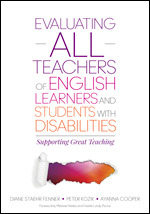Evaluating ALL Teachers of English Learners and Students With Disabilities
no information available
Teacher evaluation can be a valuable tool for evaluators and teachers alike. But it should never be used in a “one-size-fits-all” manner, especially when evaluating all teachers who work with the nation’s growing numbers of English learners (ELs) and students with disabilities. Just as these diverse students’ needs require nuanced teaching methods, the evaluations of all teachers who work with these students require unique considerations. Such considerations are precisely what you’ll learn in this comprehensive, action-oriented book. Drawing on a focused array of authoritative research on supporting the success of ELs and students with disabilities, case studies, and action plans, the authors detail Four principles for inclusive teacher evaluation of diverse learners that are compatible with the Danielson and Marzano frameworks Sample specialized “look-fors” that evaluators can use and adapt to recognize effective teaching of ELs and students with disabilities Strategies for coaching teachers of ELs and students with disabilities who need more support reaching these learners Teaching ELs and students with disabilities can be one of the most challenging experiences in an educator’s career, and also one of the most rewarding if educators have the tools they need. With this book, the first of its kind, your school can become a leader in the field by taking part in conversations that center on equitable teaching of diverse learners as well as valid evaluation of those who serve them in classrooms. “Staehr Fenner, Kozik, and Cooper provide a framework for rich instructional conversations that moves teacher evaluation from the blame game to a collaborative and informative process that empowers teaching effectiveness and student learning.” -Spencer Salend, Emeritus Professor of Educational Studies State University of New York at New Paltz “In this book, the authors successfully outline an objective assessment framework that builds educators’ individual and collective capacity to improve their practice, not only with ELs but with all their students. A must-read for teachers and evaluators alike.” -Rosa Aronson, Executive Director TESOL International Association ... Read more Read less











